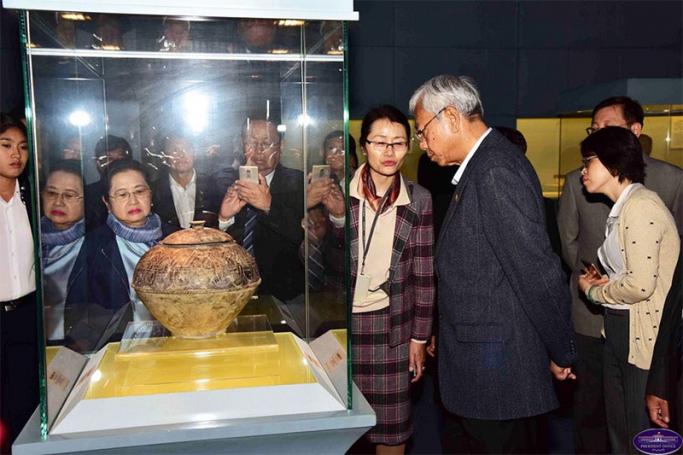Myanmar President U Htin Kyaw arrived in China for his state visit last week, his first Beijing trip since assuming office. The two sides are expected to discuss border security and economic cooperation. With economic growth slowing down, Myanmar's ruling National League for Democracy (NLD) has seen decreasing approval rate. In this context, Htin Kyaw's Beijing visit is expected to positively affect Myanmar's politics, economy and diplomacy.
The NLD won eight seats in the national parliament but only one out of 10 seats in regional parliaments in the just-concluded by-elections. Although the result will not affect Myanmar's power structure, it reflects Myanmar public's view on the NLD government. Since the beginning of Htin Kyaw's term in office, issues such as fiscal deficit, inflation and trade imbalance have been escalating in Myanmar. It is unrealistic for the NLD government to boost Myanmar's foreign investments and rapidly improve domestic economy in a short time. The people, pressured by currency devaluation and rising prices, are dissatisfied with the NLD. Bureaucracy within the government, weak legal consciousness and religious conflicts have also impeded Myanmar's economic development.
The NLD government announced Myanmar's future economic development framework, published new Myanmar Investment Law and relaxed import and export restrictions to help boost the country's sluggish economy. But whether the economic situation can improve depends on the effective implementation of the above policies.
Conflicts between the government and ethnic groups, inherited from the junta era, have yet been properly addressed. No substantive results have been achieved in the 21st century Panglong Conference last August. The second conference, supposed to have been held in February, was postponed. This showcases the complexity and hardship of Myanmar's peace process.
Since the end of the junta era, some Myanmars turned to the West for help in reform and construction, and were suspicious of China's involvement. However, the West disappointed them. China, on the contrary, is Myanmar's main partner in its peace and economic development. Apart from winning more domestic backing, the NLD government needs exterior support to stabilize its status quo. Cooperation with China, Myanmar's largest neighbor, is the best option for the NLD.
Htin Kyaw stated on several occasions that China-Myanmar friendship has a solid basis, Nay Pyi Taw will not forget Beijing's support in Myanmar's peace process, economic development and the improvement of people's livelihood, and is willing to have high-level exchanges with China to deepen cooperation.
China supports and has played an active role in Myanmar's national reconciliation process. Beijing urges all parties concerned to reach a consensus and proceed with economic development in a peaceful environment. Armed conflicts in northern Myanmar have resulted in civilian casualties and a large number of residents have fled to China. The Chinese side has properly accommodated the residents and meanwhile, has taken actions to maintain the stability in border regions.
As the conflicts in northern Myanmar have severely jeopardized China's border security, China is attempting to play an active role in Myanmar's peace negotiations. China carried out joint military drills near its border with Myanmar at the end of March to demonstrate its determination and capability to safeguard its border and people. Earlier, Agricultural Bank of China suspended the account used to fund the Myanmar National Democratic Alliance Army, demonstrating that Beijing does not condone any activity that may damage the Beijing-Nay Pyi Taw relationship and border stability.
At present, China is the largest trading partner and foreign investor to Myanmar. Beijing is actively promoting China-Myanmar capacity cooperation. China-initiated Asian Infrastructure Investment Bank, Silk Road Fund and China-ASEAN Investment Cooperation Fund are significant supporters of Myanmar's infrastructural construction. The Sino-Myanmar oil pipeline is set to begin construction shortly.
However, Beijing-Nay Pyi Taw economic cooperation still faces obstacles. The Myanmar government should closely cooperate with parties concerned, abandon nationalist tendency in the exploitation of resources, strengthen infrastructural construction and improve the investment environment to address the country's long-term problems. Meanwhile, China should have deeper understandings of Myanmar's economy and politics, and continue to support the NLD's efforts for peace, reform and national reconciliation.
The two sides are expected to have close cooperation on the One Belt and One Road initiative, the Bangladesh-China-India-Myanmar Economic Corridor, the China-Indo China Peninsula Economic Corridor, and Lantsang-Mekong cooperation mechanism. Comprehensive strategic cooperative partnership has been established between China and Myanmar, and the two countries should support each other's development strategies in their future relationship.
You are viewing the old site.
Please update your bookmark to https://eng.mizzima.com.
Mizzima Weekly Magazine Issue...
14 December 2023
New UK Burma sanctions welcome...
13 December 2023
Spring Revolution Daily News f...
13 December 2023
Spring Revolution Daily News f...
12 December 2023
Spring Revolution Daily News f...
11 December 2023
Spring Revolution Daily News f...
08 December 2023
Spring Revolution Daily News f...
07 December 2023
Diaspora journalists increasin...
07 December 2023
Naungcho to be transformed into tourist destination












